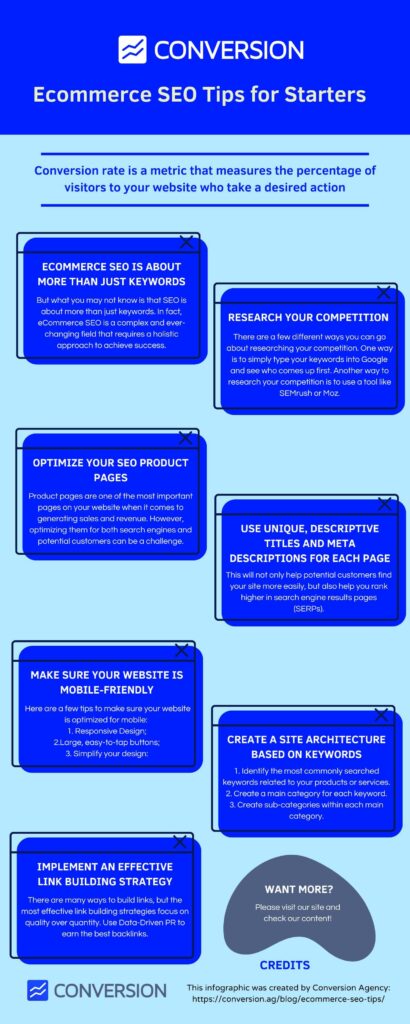Ecommerce SEO is the process of optimizing your online store for search engines. It helps you get more traffic from organic search and more sales.
If you’re running an ecommerce business, you know that generating sales is your top priority. And if you’re looking for ways to increase sales, one of the best places to start is with your SEO strategy.
Search engine optimization is a solid and stable way to earn long-term organic traffic. And while there are no guarantees in SEO, following the right SEO for e-commerce tips can help give your website and online store the boost it needs to generate more sales.
In this blog post, we’ll share 10 actionable ecommerce SEO tips that you can start using today to improve your chances of ranking higher in search engine results pages and generating more sales.
Introducing eCommerce SEO
As the digital landscape continues to evolve, so too must the way we market our products and services. One of the most important aspects of any online business is ensuring that your website appears as high as possible in search engine results pages (SERPs), as this can make a significant difference to your bottom line.
This is where eCommerce SEO comes in. Search engine optimization for eCommerce websites is a complex and ever-changing beast, but there are some key tips and tricks that can help you boost your visibility and generate more sales.
In this article, we’ll take a look at what eCommerce SEO is, why it’s important, and some top tips for getting started. So, let’s dive in!
Infographic The 10 Best eCommerce SEO Tips

- eCommerce SEO is about more than just keywords
- Research your competition and choose your target keywords carefully
- Optimize your product pages for both search engines and potential customers
- Use unique, descriptive titles andmeta descriptions for each page
- Make sure your website is mobile-friendly
- Create a site architeture based on keywords
- Implement an effective link building strategy
- Use tools like Google Analytics to track your progress
- Always keep up with the latest SEO trends and best practices
- Hire an experienced eCommerce SEO agency or specialist
1. eCommerce SEO is about more than just keywords
As an eCommerce business, you know that ranking highly in search engine results is essential to driving more traffic and sales. But what you may not know is that SEO is about more than just keywords. In fact, eCommerce SEO is a complex and ever-changing field that requires a holistic approach to achieve success.
Here are some of the things that eCommerce SEO is about:
1. Keywords, of course! But it’s not just about cramming in as many keywords as possible. You need to use relevant, targeted keywords throughout your site – from your titles and product descriptions to your blog posts and meta tags – to help search engines understand what your site is all about and match it with relevant searches.
2. Optimizing your website for both search engines and users. That means making sure your site is fast, mobile-friendly, and easy to navigate. It also means creating quality content that provides value to your visitors and helps them convert into customers.
3. Building links. Link building is an important part of any SEO strategy, but it’s especially important for eCommerce websites. That’s because links help search engines understand the popularity and authority of your site, which can influence your rankings positively.
4. Tracking & measuring your results. Finally, you need to track your SEO progress and measure your results so you can adjust your strategy as needed and continue moving towards your goals. This includes monitoring things like your organic traffic, conversion rate
2. How to Research your competition and choose your target keywords carefully
One of the most important things you can do is research your competition and choose your target keywords carefully.
There are a few different ways you can go about researching your competition. One way is to simply type your keywords into Google and see who comes up first. Take a look at their website and see what they’re doing that’s working well for them.
Another way to research your competition is to use a tool like SEMrush or Moz. These tools will give you insights into how much traffic your competitors are getting, what keywords they’re ranking for, and more.
3. Optimize your product pages for both search engines and potential customers
Product pages are one of the most important pages on your website when it comes to generating sales and revenue. However, optimizing them for both search engines and potential customers can be a challenge. Here are some tips to help you optimize your product pages for both search engines and potential customers:
1. Use keyword-rich titles and descriptions: Titles and descriptions are two of the most important elements on a product page. Make sure to include relevant keywords in both the title and description to help improve your page’s visibility in search engine results pages (SERPs).
2. Optimize your images: In addition to including keyword-rich titles and descriptions, also make sure to optimize your images. Include relevant keywords in image file names and ALT text to help improve your chances of ranking high in image search results.
3. Use social proof: Social proof is a powerful tool that can help increase conversions on product pages. Include customer testimonials, reviews, or other forms of social proof on your product pages to show potential customers that others have had positive experiences with your products or services.
4. Make use of Call-to-Actions (CTAs): CTAs are another important element on product pages. Include strong CTAs that encourage potential customers to take action, such as “Buy Now” or “Add to Cart.”
5. Focus on user experience: Finally, always keep the user experience in mind when optimizing your product pages. Make sure that
4. Use unique, descriptive titles and meta descriptions for each page
It’s important to use unique, descriptive titles and meta descriptions for each page of your website in order to help improve your ecommerce SEO. This will not only help potential customers find your site more easily, but also help you rank higher in search engine results pages (SERPs).
Make sure that your titles and meta descriptions are clear and concise, and include relevant keywords for your product or service. If you have a lot of products or pages on your site, consider using a title generator or plugin to help with the process. Ultimately, the goal is to make it as easy as possible for potential customers to find what they’re looking for on your site.
5. Make sure your website is mobile-friendly
As more and more people use their mobile devices to browse the internet, it’s important to make sure your website is mobile-friendly. Here are a few tips to make sure your website is optimized for mobile:
– Use a responsive design: This ensures that your website will automatically adjust to fit any screen size.
– Use large, easy-to-tap buttons: Mobile users have smaller screens and fingers, so it’s important to make sure your buttons are large enough to be easily tapped.
– Simplify your design: Mobile users don’t want to scroll through pages and pages of content. Keep your design simple and easy to navigate.
By following these tips, you can make sure your website is mobile-friendly and ready for the growing number of mobile internet users.
Test here how easily your visitor can use your site on a mobile device.
6. Create a site architecture based on most searched keywords
One of the most important things you can do is create a site architecture that is based on the most commonly searched keywords. This will help ensure that your site is optimised for the right keywords and that visitors are able to find what they are looking for easily.
Here are a few tips for creating an effective site architecture:
1. Identify the most commonly searched keywords related to your products or services.
2. Create a main category for each keyword.
3. Create sub-categories within each main category.
4. Optimise your website navigation so that it is easy for visitors to find the information they are looking for.
5. Use breadcrumbs on your website so that visitors can see their location within your site structure at all times.
By following these tips, you can create a site architecture that will be both user-friendly and search engine friendly, helping you to generate more sales from your ecommerce website.
7. Implement an effective link building strategy
There are many ways to build links, but the most effective link building strategies focus on quality over quantity. Creating great content that other people want to read and share is a great way to earn links organically. You can also reach out to other website owners and ask for links, with a Data-Driven PR approach.
Building links is an important part of any SEO strategy, so be sure to take the time to do it right.
8. Use tools like Google Analytics to track your progress and ROI
To accurately measure the ROI of your eCommerce SEO efforts, you’ll need to track a few key metrics including website traffic, conversion rate, and average order value.
Website traffic can be tracked using Google Analytics or other similar tools. Conversion rate is the percentage of visitors who take a desired action on your website (such as making a purchase). Average order value is the average amount that each customer spends on your website.
You can calculate your eCommerce SEO ROI by dividing your total revenue by your total cost of SEO (including time and money invested). For example, if you spend $100 on SEO and it generates $1,000 in sales, your ROI would be 10%.
Investing in eCommerce SEO can be a great way to boost sales and grow your business. By tracking the right metrics, you can ensure that your efforts are paying off and adjust your strategy accordingly.
9. Always keep up with the latest SEO trends and best practices
SEO is always changing, and it can be difficult to keep up with the latest trends and best practices. However, it’s important to stay up-to-date on SEO if you want your ecommerce business to be successful.
10. Hire an experienced eCommerce SEO agency or specialist
If you’re serious about generating more sales from your eCommerce website, then you need to invest in quality SEO. Hiring an experienced eCommerce SEO agency or specialist is the best way to ensure that your website is optimised for search engines and that you’re getting the most out of your SEO efforts.
A good eCommerce SEO agency will have a team of experienced professionals who are up-to-date with the latest trends and algorithms. They’ll be able to help you with keyword research, on-page optimisation, link building, and much more. And, most importantly, they’ll be able to track and measure your results so that you can see a real return on investment.
If you don’t have the budget to hire an agency or specialist, then there are a few things you can do yourself to improve your eCommerce SEO. Make sure you’re using relevant keywords throughout your website, from your product pages to your blog posts. Optimise your title tags and meta descriptions so that they’re enticing and informative. And build high-quality backlinks to your website from authority sites in your industry.
We’re the largest SEO Agency in Brazil and if you’re looking for International SEO or International Link Building please keep in touch with us.
Conclusion
Generating more sales through your ecommerce store can seem like a daunting task, but it doesn’t have to be. By following these 10 tips for ecommerce SEO, you can give your store the boost it needs to attract more visitors and convert them into paying customers. Implement these tips today and start seeing results tomorrow.
